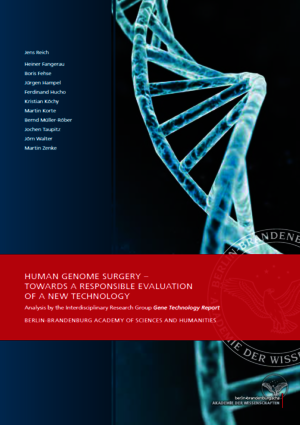
Editors: Jens Reich, Heiner Fangerau, Boris Fehse, Jürgen Hampel, Ferdinand Hucho, Kristian Köchy, Martin Korte, Bernd Müller-Röber, Jochen Taupitz, Jörn Walter, and Martin Zenke
Human Genome Surgery – Towards a responsible evaluation of a new technology
Berlin 2015
New and precise genetic engineering methods for altering DNA in living cells are currently revolutionising biomedical research. They are being intensively discussed in science and the public under the generic term „genome surgery“ [later replaced by „genome editing“]. The Interdisciplinary Research Group (IAG) Gene Technology Report is in favour of research into these promising methods for the medical field in principle, but is clearly opposed to experiments on the human germ line at this point in time.
The IAG advocates conducting a responsible and transparent ethical discourse on the application of fundamentally new methods in human medicine even before they have reached application maturity and before political regulations are possibly pending. For this reason, the authors present what they consider to be the most important social issues associated with targeted germline modification in this analysis. They emphasise that the new genome surgery methods should not be considered in isolation; rather, their ethical defensibility depends on the context in which they and the goal with which they are applied.
The IAG demands a moratorium on the application of genome surgery to the human germline. The time of the moratorium is to be used for further research into the opportunities and risks of the procedure as well as for a societal debate on the ethical and legal issues of germline genome therapy.
The IAG's analysis can be found in German here and in English here.